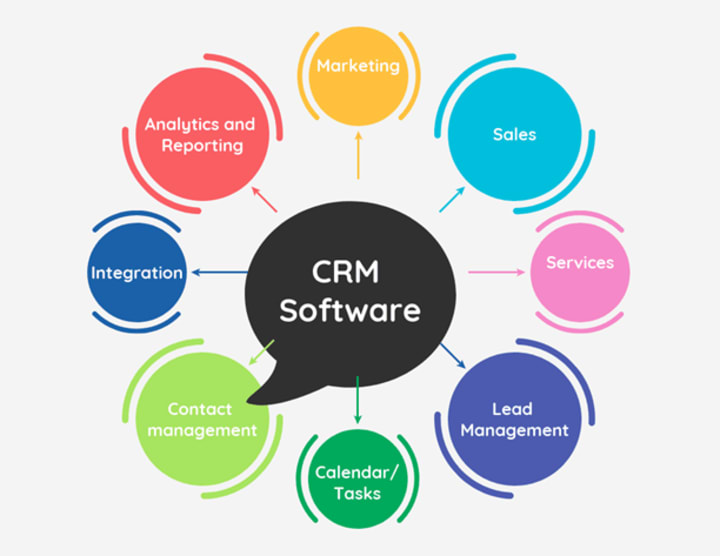Unlocking Business Growth: The Ultimate Guide to CRM Software Selection
CRM Software Guide

Keeping one step ahead of the competition is becoming more than simply a goal in the fast-paced business environment of today. As a company owner, you're always looking for methods to increase productivity, strengthen client connections, and streamline operations. Presenting CRM software, the unsung hero of contemporary business administration. We'll dive deep into the world of Customer Relationship Management (CRM) software in this extensive guide, examining its importance, helping you through the selection process, and providing you with the knowledge and resources you need to make a wise choice that will take your company to new heights.
Click Here For Your CRM Software
I. Understanding the Importance of CRM Software
Why CRM Matters:
CRM software, which acts as a single hub for managing interactions with customers and prospects, is the foundation of prosperous firms. CRM software enables companies to provide individualized experiences, optimize workflows, and spur revenue growth by combining customer information, communication histories, and sales activity onto a single platform. CRM software is essentially the key to gaining a deeper comprehension of the requirements, preferences, and behaviors of your customers—a knowledge that will allow you to better customize your products and marketing campaigns.
The Pitfalls of Manual Systems:
While some companies may still handle client data manually using spreadsheets or sticky notes, these antiquated techniques have serious disadvantages. Errors, inconsistencies, and inefficiencies are common with manual systems, which can result in lost opportunities and irate clients. Furthermore, manual processes become more and more unsustainable as your firm expands, impeding scalability and reducing your capacity to provide outstanding customer experiences. Automation is key in today's digital world, and CRM software provides the answer you need to keep on top of things.

II. Identifying Your Business Needs
Assessing Your Requirements:
It's critical to assess your company's needs and goals before launching into the world of CRM software. To begin, thoroughly evaluate your present procedures, problems, and opportunities for development. Are you finding it difficult to record consumer interactions? Do you require improved sales pipeline insights? You can focus on solutions that meet your objectives and reduce the number of possibilities available to you by specifying your precise criteria.
Defining Objectives:
It's time to set specific goals for the deployment of your CRM software after you've evaluated your demands. Ensuring alignment with your overall business strategy and guiding your decision-making process are two benefits of defining measurable goals, regardless of your objective: increasing sales income, improving customer satisfaction, or enhancing marketing effectiveness. Recall that the ideal CRM software should assist your long-term growth goals in addition to meeting your urgent wants.
III. Exploring Key Features and Functionality
Core Features Overview:
A number of essential functions included in CRM software are intended to improve sales efficiency and simplify customer administration. These features, which range from pipeline management and job automation to contact management and lead monitoring, set the groundwork for efficient client relationship management. CRM software enables your team to provide personalized experiences at every touchpoint by centralizing customer data and offering real-time insights, which eventually increases conversions and cultivates loyalty.
Advanced Functionality:
Many CRM platforms offer enhanced capabilities in addition to fundamental features to address the changing needs of contemporary enterprises. Workflow automation, sophisticated reporting, and third-party tool connection are just a few of the features that may improve decision-making, productivity, and teamwork within your company. You can achieve new heights of efficacy and efficiency by utilizing these cutting-edge features, giving you a competitive advantage in your sector.
IV. Evaluating CRM Options
Researching Available Solutions:
Selecting the best CRM software package can seem like a difficult undertaking because there are so many options on the market. Investigate potential solutions and familiarize yourself with their features, costs, and user ratings to begin the process of reducing your options. To ensure a seamless adoption process, look for CRM platforms that offer scalability, strong customer support, and industry-specific features.
Comparative Analysis:
After you've narrowed down your alternatives for CRM, compare the advantages and disadvantages of each platform using a comparison study. To get the solution that best suits your needs and goals, take into account many variables like scalability, customisation possibilities, ease of use, and integration capabilities. Remember to include important stakeholders in the decision-making process to secure support and guarantee alignment with your company's objectives.
Click Here For Your CRM Software
V. Considering Implementation and Integration
Planning for Implementation:
CRM software implementation is a strategic project that needs to be carefully planned and carried out. It is not only a technical task. Create a thorough implementation plan first, outlining the important dates, roles, and checkpoints for your CRM rollout. To reduce interruptions and increase acceptance throughout your company, take into account elements like change management, employee training, and data migration.
Integration Possibilities:
The seamless integration of CRM software with other tools and systems in your business ecosystem is one of its main advantages. Whether you use e-commerce platforms, accounting software, or email marketing software, connecting your CRM with these platforms may improve workflows, get rid of silos, and provide you a comprehensive picture of customer interactions. Examine integration options with the CRM platform of your choice to get more value and optimize your return on investment.
VI. Budgeting and Cost Considerations
Understanding Pricing Models:
Pricing structures for CRM software can differ significantly based on functionality, user licenses, and subscription plans, among other things. Spend some time learning about the various price models that CRM vendors provide before making a choice. These models range from per-user cost to tiered pricing based on usage or features. Select a pricing model that is in line with your financial objectives by taking your budgetary restrictions and long-term growth expectations into account.
Total Cost of Ownership:
When assessing CRM choices, it's critical to take the total cost of ownership (TCO) into account in addition to upfront expenditures. TCO includes subscription fees as well as implementation, training, and continuing maintenance costs. You may make an informed decision that covers all related costs and guarantees a favorable return on investment by evaluating the total cost of ownership (TCO) of any CRM platform over a period of several years.
VII. Seeking User Feedback and Reviews
Harnessing User Experiences:
Reviews and comments from users can offer priceless information about the advantages and disadvantages of various CRM systems. Speak with current members of your network or industry to learn about their personal experiences and suggestions. In order to make informed decisions, take into account aspects like customer support, simplicity of use, and user happiness while analyzing user feedback.
Case Studies and Success Stories:
These provide specific instances of how CRM software has assisted companies similar to yours in achieving observable outcomes, in addition to user feedback. To get inspired and confident while choosing a CRM, look for case studies that emphasize particular difficulties, solutions that were put into place, and quantifiable results. It is possible to make better decisions and establish more reasonable expectations for your own CRM deployment by taking the time to learn from the experiences of others.

VIII. Making Your Selection
Final Decision Criteria:
When the last steps of your CRM selection process draw near, it's critical to review your selection criteria and rank the elements that matter most to your company. Determine the essential features and functionalities that will provide value to your company, whether it's scalability, ease of use, or integration potential. You may choose the CRM solution that best suits your needs and goals with confidence if you maintain focus on your decision-making criteria.
Tips for Implementation Success:
After selecting a CRM platform, the actual job of implementation starts. To guarantee a triumphant implementation, proficiently convey your strategies to your staff and offer all-encompassing instruction.
Click Here For Your CRM Software
About the Creator
Enjoyed the story? Support the Creator.
Subscribe for free to receive all their stories in your feed. You could also pledge your support or give them a one-off tip, letting them know you appreciate their work.





Comments
There are no comments for this story
Be the first to respond and start the conversation.